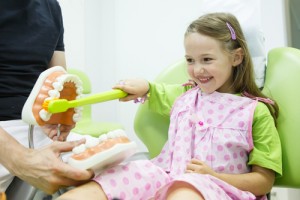10 Questions To Ask Your Pediatric Dentist
All parents want their children to be happy and healthy. This includes having healthy teeth and gums. Brushing and flossing at home is a great first step, but regular dentist visits are vital to keep tooth decay at bay and prevent cavities from forming.
You probably have some important questions about your child’s oral health. Find the answers you’re looking for from Dr. Evanson.
At what age should I start bringing my child to the dentist?
 The American Academy of Pediatric Dentistry (AAPD) recommends taking your child to the dentist by his first birthday. By starting good habits young, you can prevent dental problems and get your child comfortable with the dentist from an early age.
The American Academy of Pediatric Dentistry (AAPD) recommends taking your child to the dentist by his first birthday. By starting good habits young, you can prevent dental problems and get your child comfortable with the dentist from an early age.
Dr. Evanson is accustomed to treating very young children and doing everything possible to make them feel comfortable during their first visit and all subsequent visits to our office.
Why do baby teeth matter?
It’s easy to think that since primary “baby” teeth fall out, it doesn’t matter if they decay. However, primary teeth set the stage for adult teeth and guide them to the correct position. Primary teeth also impact your child’s speech, chewing and appearance. Taking good care of them from a young age encourages good dental habits that will last a lifetime.
What should I expect from the first visit?
The way Dr. Evanson handles your child’s first visit depends on his age, level of anxiety and any dental concerns you have. The goal is to at least complete a dental exam and apply a fluoride varnish. For extremely apprehensive children, a brief exam while you hold your child in your lap is a good first step to get him comfortable with coming to the dentist.
How often should I schedule dentist appointments for my child?
It’s recommended for children and adults alike to see the dentist every six months. This provides the chance to catch cavities early so they can be treated quickly. This limits damage to the teeth and helps your child maintain a healthy smile into adulthood.
Do I need to brush my baby’s teeth?
Baby teeth can accumulate plaque at any age, so it’s good to get in the habit of cleaning your child’s teeth as they appear. For very young children, rubbing a wet washcloth or dental wipe on the teeth before bedtime is a good way to prevent tooth decay.
As your baby gets older, switch to a child’s toothbrush and introduce fluoride-free “training toothpaste.” Once he masters the concept of spitting toothpaste out at around 4 years old, you can switch your child to fluoride toothpaste.
How is a pediatric dentist different from a family dentist?
Dentists such as Dr. Evanson who have training in pediatric dentistry know how to care for children’s teeth and gums from infancy up to adolescence. In addition to this targeted training, pediatric dentist offices are designed to make children feel more comfortable. Staff members are also experienced with handling dental anxiety in children to make visits as pleasant as possible.
Should I discourage my child from sucking his thumb?
Thumb sucking, using a pacifier and drinking from a bottle are soothing activities that may help your child self-soothe. As a parent, the time frame you choose to wean your child from these dependencies is your decision, but if you allow thumb sucking to continue once permanent teeth are ready to erupt, your child could suffer from bite alignment problems and speech impairment.
Are dental sealants a good option for my child?
The purpose of dental sealants is to prevent bacteria and food from settling in the pits located on the biting surfaces of molars. We usually only apply them to newly erupted permanent teeth, meaning your child could certainly be a candidate for this cavity-prevention treatment starting at about age 6.
Do you offer sedation dentistry?
Some children have severe anxiety about going to the dentist. With sedation dentistry as an option, you can ensure your child still maintains a healthy smile.
Dr. Evanson offers local anesthesia, nitrous oxide and IV sedation to counter issues with anxiety or excessive wiggling during treatment. These are safe methods proven to make each dental visit safer and more effective.
Are dental x-rays safe?
Radiographs (x-rays) are an important part of the diagnostic process. Dr. Evanson follows the recommendations established by the AAPD and the American Dental Association (ADA) when taking x-rays. Our office uses the latest digital radiographic equipment to lower the risk of radiation exposure. The risk is negligible. In fact, it’s much riskier to leave a dental problem undetected than to have an x-ray.
If you’re ready to start your child down the path to good oral health, please contact Evanson DDS online or call us at (720) 409-0008 to set up an appointment.
Leave a reply →





